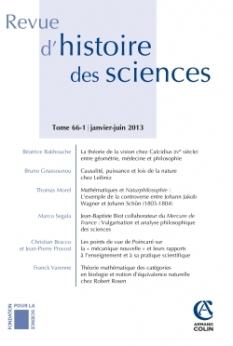
Revue d'histoire des sciences - Tome 66 (1/2013)
Pour acheter ce numéro, contactez-nous
Recevez les numéros de l'année en cours et accédez à l'intégralité des articles en ligne.
Cet article a pour objet la conception des lois de la nature chez Leibniz, qui sont fondamentalement des expressions d’invariances naturelles. On montre que cette conception ne peut être dissociée de sa conception de l’interaction causale, que, contrairement à une opinion répandue et malgré ce que suggèrent certains de ses écrits, Leibniz n’a jamais rejetée. Cette conception exerce une pression conceptuelle considérable sur sa façon de concevoir les lois de la nature. En effet, la notion moderne de loi de la nature et la notion scolastique d’interaction causale, dont Leibniz a besoin pour penser la force, tirent dans des directions opposées. On montre comment Leibniz transforme les concepts aristotéliciens d’action et de changement, inventant la notion de changement intransitif, pour défendre l’idée que les symétries de la nature sont fondées sur la répartition des activités des substances.
This paper deals with Leibniz’s conception of laws of nature, which is fundamentally the expression of natural invariances. It shows that this conception cannot be disconnected from that of causal interaction, which contrary to a widespread opinion and in spite of what some of his writings seem to suggest, he never denied, and which exerts a considerable conceptual pressure on his view on laws of nature. Indeed, the modern notion of law of nature and the scholastic notion of causal interaction, which Leibniz needed in order to make intelligible the notion of force, pull in opposite directions. It is shown how Leibniz transformed the Aristotelian notions of action and change, inventing the concept of intransitive change, to argue that symmetries in nature should be grounded in the distribution of activities of substances.